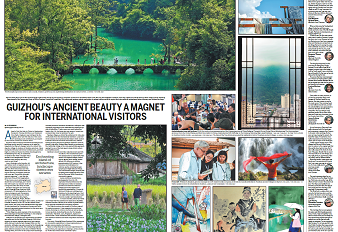Endangered Guizhou snub-nosed monkey on intl list

The Guizhou snub-nosed monkey is an exceptionally rare species that can only be found in Guizhou's Fanjing Mountain National Reserve. [Photo/Guizhou Daily]
According to a meeting of the International Primatological Society held on Jan 13 in Ecuador, in South America, the Guizhou snub-nosed monkey (Rhinopithecus brelichi) has now been listed as one of the world's 25 most endangered primates by the International Union for Conservation of Nature (IUCN).
Guizhou snub-nosed monkeys live only in the Fanjing Mountain National Reserve in the city of Tongren, located in Southwest China's Guizhou province.
The population is currently estimated at between 250 to 300 monkeys, making them wild animals under national first-class protection. They've also been placed on Appendix I of the Convention on the International Trade in Endangered Species of Wild Fauna and Flora (CITES) and put on the IUCN Red List of Threatened Species.
The application for being listed was co-prepared and submitted by the secretariat of the primatology branch of the China Zoological Society and a team led by professor Zhou Jiang – a professor at Guizhou Normal University and a member of the China Endangered Species Scientific Commission.
The listing of the Guizhou snub-nosed monkey is said to represent China's concern and efforts in species protection and is also international recognition of China's research and protection of primates.
In Tongren's Jiangkou county, which is located in the center of the Fanjing Mountain National Reserve, about 70 percent of the area is listed as natural reserves. The county is said to have been utilizing its natural resources to protect its environment, while developing the local economy.
Fanjing Mountain is said to preserve the most complete primitive forests on its latitude, being home to more than 7,150 species of flora and fauna.
In recent years, Tongren has reportedly launched various protection regulations and plans to enhance the local environment. At the 15th meeting of the Conference of the Parties (COP15) in October last year – Jiangkou's Taiping town was appointed as a national practice and innovation base for fulfilling China's "lucid waters and lush mountains are invaluable assets" national environmental concept.
京ICP备13028878号-8







 Overview
Overview
 Guiyang
Guiyang
 Guian New Area
Guian New Area
 Liupanshui
Liupanshui
 Anshun
Anshun
 Qianxinan
Qianxinan
 Qiandongnan
Qiandongnan
 Qiannan
Qiannan
 Zunyi
Zunyi
 Tongren
Tongren
 Bijie
Bijie
 75 years on: Guizhou's great leap to prosperity
75 years on: Guizhou's great leap to prosperity
 China (Guizhou) Intl Alcoholic Beverages Expo
China (Guizhou) Intl Alcoholic Beverages Expo
 China Life Tips: Unlocking mobile payments
China Life Tips: Unlocking mobile payments


